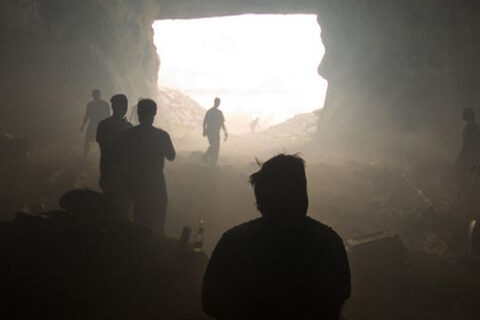One thing I’ve always advised folks is to read what your opponents read. It’s why I occasionally check Pinknews, Times of Israel, and The Root to see what leftists and ethnocrats tell each other. More recently, I decided to read through The Great Reset, written by Klaus Schwab and Thierry Malleret, to see what these people hope for the world of tomorrow. It is about as dark as I’d imagined. This book is essentially the stereotypical globalist pretending to have your best interest at heart saying “nationalism bad, sacrifice sovereignty, and consume to be happy.”
This is a long book and there’s a lot to get through. There are many important takeaways (like the fact that the U.S. dollar being the global reserve currency artificially inflates U.S. standards of living), so I’m just going to focus on the two most important themes I found in the book. Also, there are two authors of this book, but I’m just going to refer to them as “Schwab” and “he” throughout this article. I’m doing this both because writing “the authors” throughout is annoying and because Schwab’s contributions are almost certainly more significant than those by Malleret.
The first theme is that COVID gives us the opportunity to reset our world, particularly to “go green” and also to push more social justice. The way he argues this is laughable. Schwab makes the absurd claim that investors in a company can pressure businesses to go green (149). Ignoring the potential legal ramifications of wealthy majority stockholders, who want to social-signal, trying to force that on a company (a concept known as “shareholder oppression”) there’s the fact that most shareholders would likely just sell their stock in response to such a move because it would undoubtedly be bad for their bottom line.
The book pretends that if people want something enough, like a vaccine or green energy, it magically gets available faster. Obviously, this is a provably false statement. Every nation wants nukes, as it’s the only protection against America “spreading democracy” to them, yet few develop them. So, too, is the case with efficient green energy. Schwab talks about activists holding businesses accountable to make this happen, but ignores the simple fact that Nestle uses slave labor, BP pollution via oil spills, and United Fruit Company caused foreign coups, all without any serious punishment. The idea that private people can hold these businesses accountable is absurd (189).
Schwab discusses how the EU is pushing going green and carbon neutrality (they’re spending a trillion dollars to go carbon neutral by 2050) (149). There’s nothing in this about how to make alternative energy more efficient (again, it seems it’s just that if we want it enough, it’ll become that way) and also ignores that as countries in the EU “go green” they just decrease domestic production of fossil fuels and import instead (like from those dastardly Russians). Now, it is certainly possible that in the next 30 years alternative energy will become more viable, but just as electric cars often don’t reduce pollution (both because of how they’re created and because they’re charged by local, often non-green, power sources), I seriously have my doubts.
The second main theme of the book, though less explicit than the first, is that to save the environment and fight future pandemics, we must destroy nation-states and create a supranational governing body. This isn’t said as explicitly as “we must abolish the nation-state.” Schwab just continually advocates for policies that would destroy the nation-state and continually complains about nations. He states you cannot have globalism (technically using the word “globalization”), democracy, and nation-states. He expresses this even though he points out that countries that have a stronger sense of solidarity (i.e. more ethnically homogeneous states) are able to deal with the economic hardships of COVID better than those without it (such as the U.S.) (88). This opposition to ethnocentrism and nationalism is expressed at numerous times as is the constant refrain for more globalism, often in the same breath.
The reason why he wants the end of nationalism is because it’s the only way to have globalism (and I’m sure it has nothing to do with the fact that more diverse areas are unable to work together to unionize). He says it’s “impossible to bring globalization to an end” (106). In fact, he advocates countries giving up sovereignty to the UN and WHO to handle future crises, even though he admits the latter is largely inefficient (117-118).
He makes the insane claim that nationalism makes it harder to deal with the outbreak of viruses. Yes, on the one hand a global government could create uniform rules and restrictions to mitigate the spread, but so too would travel/immigration moratoriums. If we’d actually cut off contact with China and not encouraged people to seek out the Chinese, it wouldn’t have come here or been as bad (102-103).
Schwab says many disjointed things in the book. He points out the UN says we need to reduce pollution by 7.6% per year over the next decade to keep the temperature from rising (oddly, NASA admits that Mars is getting warmer, other articles even point out the southern ice cap is melting, but obviously that can’t be because of increased pollution from humans) (140-141). He admits that even with the lockdowns (and our driving less) we only reduced the annual pollution by 8% (141). To reduce it another 8% next year, I suppose we’re just going to have to stop using electricity completely. Schwab contradicts the claim about 8% when he later says people saw “no air pollution” during the lockdown (148).
Schwab talks about another mass immigration happening. He implies that we can expect up to 1.8 – 2 billion more refugees to the First World, as that is the number of people living in countries that can’t handle the COVID crisis, and that the failure of these countries to handle the crisis will create a disaster similar to the 2016 immigration wave (128, 133). So, it’s pretty easy to infer from this that Camp of the Saints was right (by the way, be sure to find a copy or e-book of it before it’s scrubbed from the internet).
There’s so much doublespeak in this book that it should remind us all that we live in a weird dystopia that mixes the worst parts of Brave New World and 1984. Brave New World because of the destruction of morality and praise of degeneracy. 1984 because of the doublespeak and totalitarian control. Schwab talks about how bad nationalism is and how bad pollution is, but like so many other leftists, refuses to acknowledge that immigration is the single biggest cause for pollution in the First World. Since the 1970s, we’ve been told having a child is the worst thing for the environment. It’s not because diapers are bad or children are unique polluters, but rather because it’s an extra human living at a first world living standard. So, importing more people into the First World would logically be something environmentalists like Schwab would oppose, but no comment there. In fact, I’m sure some people are concocting a bone-headed argument about how immigration is somehow good for the environment, just like the argument that while tourism spreads COVID (hence countries banning U.S. tourists), immigration is actually what is necessary to stop COVID….somehow.
Another troubling issue in the text is that Schwab argues for an odd moral relativism based on quantum physics: “it could be inferred from quantum physics that objective reality does not exist” and he even states that there isn’t a “right” and “wrong” view (120). He was speaking specifically of the ongoing conflict between China and the U.S., but there is no reason why this doesn’t apply to anything else. This contradicts the whole point of the book, though. Schwab, you can’t argue objectively for globalism or against nationalism if you don’t believe in an objective reality.
This book is 250 pages of moralizing masquerading as economics and science. It expresses some of the worst ideas contained in book form, next only maybe to The Communist Manifesto. It advocates increased surveillance, lower standards of living, and a loss of identity. The enthusiasm and sense of righteousness that oozes from the text demonstrates the most important takeaways from the current cultural divide. Those who disagree with us don’t just believe we are wrong. They believe we are evil. If you don’t support globalism/globalization or you do support nationalism, then you support an unlivable world of climate change, war, famine, and death. Though these people seem like moral relativists, they only take this position opportunistically. These people may be atheists, but they are as devout in their beliefs as the most radical religious extremists. These people will attempt to force their church of no salvation on the world with as much fervor as the most crazed zealots in history.
A Southern man trying to make a good Southern plan.
Deo vindice!






Jay Dyer at jaysanalysis.com and on YouTube does a masterful analysis. Here’s a two-minute summary: https://youtu.be/XQifxlzeuy4
These elite fools who would rule over us get more hilarious by the minute. Is a modern-day Nathan Bedford Forrest available to defy this sumbitch and his minions?
Quote Of The Day from SurvivalBlog [paraphrased]:
“What do you get from mixing science with politics? You get politics.”
attributed to Dave Collum